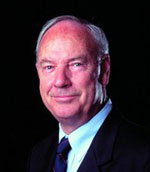Professor Donald Metkalf
International Awards
Grand Hamdan International Award
- Stem Cell Research
2007-2008
Professor Donald Metcalf was born in Mittagong, New South Wales, Australia, and was educated in various country schools. He graduated in medicine from Sydney University in 1953 after completing a BSc (Med) in virology. After an internship at The Royal Prince Alfred Hospital, Sydney, he joined the staff of The Walter and Eliza Hall Institute of Medical Research in Melbourne in 1954 as the Carden Fellow in Cancer Research, a position he continues to hold.
From 1965 to 1996, he was Head of the Cancer Research Unit and Assistant Director of The Walter and Eliza Hall Institute and in 1996 became Professor Emeritus of The University of Melbourne.
Professor Metcalf has been rightfully called "the father of hematopoietic cytokines" for his pioneering work on the control of blood cell formation. In early studies, he discovered the function of the thymus gland in controlling the formation of lymphocytes, and beginning in 1965, co-developed a series of specialized culture techniques permitting the growth of the various types of blood cells.
These cultures led him and his team to the discovery of the "colony¬stimulating factors" (CSFs), hormones that control white blood cell formation and are, therefore, responsible for one's resistance to infection.
His work, with that of others, led to the successful cloning of the genes for all four mouse and human CSFs, and the mass production of these hormones by bacteriaL yeast, and other cells.
His work provided the pivotal demonstration that the CSFs, when injected into animals, stimulated the formation and regulated the activity of white blood cells. Exploiting this, his collaborators then documented the effectiveness of GM-CSF and G-CSF (two primary white blood cell regulators) when injected into patients. These blood cell regulators are now in extensive clinical use throughout the world as valuable drugs, which can accelerate the regrowth of blood cells following anti-cancer treatment and bone marrow or peripheral blood transplantation.
The corpus of his fundamental and applied research is to be found in more than 400 peer-reviewed scientific papers, 200 other scientific papers, and seven books. Professor Metcalf has received some of the highest honors in the world of contemporary science. Among them, he was made a Companion of the Order of Australia; he was elected a Fellow of the Australian Academy of Science, a Fellow of the Royal Society, London; and a Foreign Associate of the National Academy of Sciences of the U.S. His prizes for research include the Wellcome Prize of the Royal Society (shared), the Bristol-Myers Award for Distinguished Achievement in Cancer Research, the Hammer Prize for Cancer, the Koch Prize of the Federal Republic of Germany, and a Gairdner Foundation International Award of Canada. In addition, Professor Metcalf shared the Alfred P. Sloan Prize of the General Motors Cancer Research Foundation; received the Bertner Foundation Award of the MD Anderson Cancer Center. and the Rabbi Shai Shacknai Prize of the Hadassah University, Jerusalem.
He is also a recipient of the Albert Lasker Clinical Medical Research Award, the Louisa Gross Horwitz Prize of Columbia University, the Jessie Stevenson Kovalenko Medal of the U.S. National Academy of Sciences, and was the inaugural recipient of the Kantor Family Prize for Cancer Research Excellence from the Hipple Cancer Research Center. In 1995 he received the Ernst Neumann Award, International Society for Experimental Hematology and the Royal Medal, Royal Society, London. In 1996 he shared the Amgen Australia Prize and The Warren Alpert Foundation Prize, Harvard Medical School. In 1998 he was made an Honorary Member of the Alpha Omega Alpha Medical Society, U.S. and in 2000 he will receive the Chiron International Award, National Academy of Medicine, Italy.
Prof Metcalf has the clarity of vision and articulation of the whole stem cell research field. He was able to put, not only much of his detailed contributions in the background, but to point out the fundamental issues related to the study of both embryonic and adult stem cell research in a fair and balanced, as well as accurate, perspective. With much of the current rancor within the scientific field of stem cell research as to which research area is best to fund and pursue, which is, unfortunately, leading to much hype that could, in the long run, hurt the scientific community's reputation and hold back research and advances, Dr. Metcalf's approach and attitude fits another famous Nobel prize winner, Victor Weisskoff's statement:" Curiosity without compassion is inhumane; however, compassion without curiosity is totally ineffective".
Don Metcalf labored in relative isolation, discovering a set of colony stimulating factors that are important for regulating the growth and differentiation of hematopoietic cells. He went on to purify some of these, and finely delineate the particular cell types in which these factors played a role. He helped lay the foundation for what is now an enormous field, and several of the growth factors that were discovered during his initial studies are now used in the practice of medicine. Dr. Metcalf continued to contribute to the field for many years, both directly and through the work of outstanding trainees.
These are the criterion that is deemed valuable in judging a scientist as being recognized as a real contributor to advancing not only his/her field, but in demonstrating the power of rational/logical thought and skillful experimental approaches, that Dr. Metcalf is chosen. The solid scientific reasons, together with humane applications of that basic knowledge to assist humanity in an ethical manner, made a powerful case for his nomination as the scientist who should represent the Grand Hamdan International Award.

